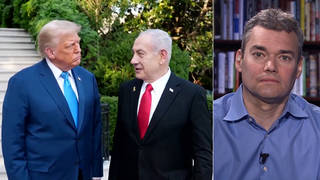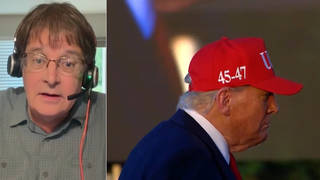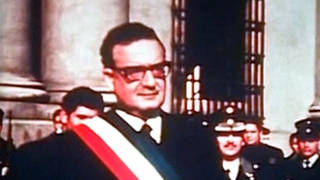
Topics
Guests
- Juan GuzmánChilean judge who formally charged General Augusto Pinochet with kidnapping and placed him under house arrest.
Democracy Now!’s Amy Goodman interviews Chilean Judge Juan Guzmán, who in 1999 became the first to prosecute Augusto Pinochet for crimes he oversaw during his 17-year dictatorship that began with the U.S.-backed coup of 1973. Guzmán recalls how “I was at the top of my career and I had received many votes to be selected as a member of the Supreme Court, and I knew when I received that case it was the end of my career,” because it would threaten the government and the army. Despite his skepticism at first, Guzmán says he came to realize most of the thousands of kidnappings and murders carried out under Pinochet were done in a systematic way. He concluded that “there were direct orders for most of the most important crimes that have been committed.”
See all of our coverage of the Chilean coup over the years on our In-Depth page marking its 40th anniversary.
JUDGE JUAN GUZMÁN: I have been a judge in Chile during more than 36 years. When I was selected to be judge in Pinochet’s case, I was a member of the appellate court of Santiago.
AMY GOODMAN: Did you want the case?
JUDGE JUAN GUZMÁN: No. Nobody wants cases that are supposed to be hot potatoes. When I received that case, I was at the top of my career, and I had received many votes to be selected as a member of the Supreme Court. And I knew, when I received that case in my hands, that that was the end of my career.
AMY GOODMAN: Why?
JUDGE JUAN GUZMÁN: Because judges that do things never arrive to the Supreme Court. Judges that do not do things or that overlook things that may be, let’s say, bad for the government, for the army, for the establishment, will—those who do them good will arrive to the Supreme Court, as long as they do not do anything at all.
AMY GOODMAN: Judge Guzmán, until that point, did you consider yourself a member of the establishment?
JUDGE JUAN GUZMÁN: I think so, yes. I considered myself a member of the establishment—critical in some things, but I would say I was a normal member of the establishment.
AMY GOODMAN: Tell us the case that you had to consider.
JUDGE JUAN GUZMÁN: Well, I received many cases that were filed against Augusto Pinochet for many different sorts of crimes. All of the crimes were homicides, kidnappings and torture, but the situations were very different. In some cases, the dictatorship wanted to conceal the crimes. In other cases, it was the perpetration of the crimes and how the people were killed and then thrown into the ocean. In other cases, it was situations that were called mouse traps. That was the way how the kidnapping was perpetrated by the groups of the—that belonged to the military police. And so on. There were hundreds of cases.
AMY GOODMAN: When you first were weighing the case against Pinochet, did you believe he had perpetrated murder and kidnapping?
JUDGE JUAN GUZMÁN: At the beginning, no. I was convinced that most of the crimes that had been committed, that we knew about, were committed by groups of soldiers, sometimes in a mission of vengeance, as that did occur also, and—or that all these excesses were committed by people that had no orders from superiors. But as soon as I continued my investigations, I realized that many of these crimes—or most of these crimes that were systematic, repeated, that had the same object, couldn’t have been performed if there was not a policy for them to be committed. So, it was—and that was discovered by many judges, by many policemen, who investigated these cases. There were direct orders for most of the most important crimes that had been committed.
AMY GOODMAN: When did you first indict Pinochet?
JUDGE JUAN GUZMÁN: The first time I indicted him was in 1999. And in that occasion, I couldn’t interrogate him, because he was playing a game of mouse and cat, or cat and mouse, with me. If I went to his home to interrogate him, he would travel in his helicopter to his country home, and so on. So then, finally, I had issued 75 questions and had sent them to him when he was in prison in Great Britain, where he answered all these questions in one simple sentence, as saying, “I am not responsible for any of the crimes that you accuse me of.” So then I considered that I had that requirement that meant that he had to be interrogated. But the Supreme Court did not think that he was thoroughly interrogated and then accepted a habeas corpus that was filed against me, and therefore I had to re-interrogate him, but really interrogate him personally, in order to be able to indictment. That occurred 20 days later, after having his mental examinations taken and after interrogating him. I did interrogate him in two occasions. I asked the lifting of his immunity in four occasions. And I indicted him in three occasions.
AMY GOODMAN: Did you rule on whether he was competent to stand trial?
JUDGE JUAN GUZMÁN: Yes, I did. I ruled in two occasions that he was competent. The first time, it was in 19—I’m sorry, in 2000, where I had his mental examinations taken by forensic experts. And in the second occasion, it was in 2004. The first time, it was for an issue called Caravan of Death. And the second occasion that I ruled saying that his mental faculties were well, that was in 2004. And that is the scene that you have in the picture, the judge and the general, where I am saying that there’s a division—a decision that has two parts. The first part is declaring that he is competent, and the second—according to the studies, the mental expertise that I received, and the second part of the decision is his indictment in a case called Operation Condor.
AMY GOODMAN: And Operation Condor was what?
JUDGE JUAN GUZMÁN: Operation Condor was a sort of pan-Americanism that took place in five of the countries of the southern part of Latin America—Argentina, Chile, Paraguay, Uruguay and Brazil. It was a plan to kill people who were against the dictatorships, mostly communists, to torture people, to interrogate people, and to make them travel from one of these countries to another, and also to commit crimes, as was the case of the Orlando Letelier and Ronni Moffitt crime in Washington, D.C.
AMY GOODMAN: Orlando Letelier, the former Chilean ambassador to the United States, and his assistant Ronni Moffitt, blown up on Embassy Row—
JUDGE JUAN GUZMÁN: Yes.
AMY GOODMAN: —their car, a bomb attached to it.
JUDGE JUAN GUZMÁN: Yes, that’s right. That was one of the crimes perpetrated through the Condor Operation.
AMY GOODMAN: How did your fellow judges respond to your indictments?
JUDGE JUAN GUZMÁN: They couldn’t believe it. Most of them, at the beginning of when I just received all—most of these cases, they sometimes gave me advices of how to get rid of these cases as soon as possible, or of how not to consider these cases important and leave them for my investigations when I had nothing else to do. So, no, the idea—it was really, at that time, very difficult to believe that Pinochet could be indicted and that a criminal case could be filed against him with success.
AMY GOODMAN: Can you talk about how you changed as a person through these investigations, what these investigations opened your eyes to?
JUDGE JUAN GUZMÁN: Well, yes, I had been, as I said before, very close to the institutions, to democracy, to many aspects, where I never asked myself more than just defining things good, better or not too good—you know, a normal person, a tangential man making a career, making a family, being happy with what I was doing. But when I realized all the pain that was suffered by—or that was produced by a system in which I had—in which I had lived happily with my family and that I had only known in a tangential form, then, when I heard the people, when I saw the people, when I received declarations, when I saw the remains of many of the bodies that had been found many years after the burials, and when I—by all mean, when I heard the people who had had people in their families disappear, well, I realized that there was a whole dimension that I had not lived and that I had not known about. And little by little, I started to have that change you are asking me about.
AMY GOODMAN: What did the indictments mean? What ultimately happened to Pinochet?
JUDGE JUAN GUZMÁN: Well, an indictment, according to Chilean law, is a declaration that the judges issue and that require three elements: to have a person interrogated; secondly, to prove that a certain crime has been committed; and thirdly, that there are presumptions that a certain person has committed those crimes. So then, once you have those three requirements, the judges have to indict. And this is very interesting to tell you, because it has never been really said before. I am starting to say it now, many years before, because I am a little bit disappointed of how many judges did not indict—all these cases, all these cases—Operation Condor, Villa Grimaldi, Villa Baviera, Operation Colombo, Venecia, and so on—
AMY GOODMAN: Villa Grimaldi was the torture center in Santiago where actually Michelle Bachelet was brought and tortured with her mother.
JUDGE JUAN GUZMÁN: That’s right. That’s right.
AMY GOODMAN: The former president and the woman who is running once again for president of Chile.
JUDGE JUAN GUZMÁN: Yes, she, according to the information that I have and that I had, she also was tortured there, as well as her mother. And I interrogated them, indeed, for these issues. Well, all these cases, you had to find who was the—who were the people who were really responsible. And in all these cases, you had necessary to arrive to Pinochet’s responsibility through the line of command. So, some of the judges—or most of the judges did not follow that sequence. They simply indicted the people who were directly involved in the torturing or in the killing or in the disappearing of the people, but they did not indict Pinochet. I always considered that it was fundamental to indict Pinochet in order to get the whole line of people who had committed those crimes.
AMY GOODMAN: Did any of your indictments lead to convictions?
JUDGE JUAN GUZMÁN: My indictments to Pinochet, no, because the Supreme Court, as well as one of the chambers of the court of appeals, overruled my decisions. So, none of my decisions that meant indictments against Pinochet arrived to trial. There were no trials in all of those cases. But all the other state—or most of the other state agents that I indicted, that were hundreds, got a conviction, and many of them a life conviction, or a conviction for life.
AMY GOODMAN: Do you feel that your country has changed?
JUDGE JUAN GUZMÁN: I would it is changing. It is changing, but not at the speed that it should be changing in. But it’s taken a conscience of all these crimes, that the people in our country know what the crimes are. And the truth regarding these crimes has proved that all these people that were considered traitors or enemies of the country were simply young people, most of them, that were striving for a better world.
AMY GOODMAN: Finally, are you happier for what you have done?
JUDGE JUAN GUZMÁN: Oh, yes. By all means, I’m happier for the work we did.












Media Options